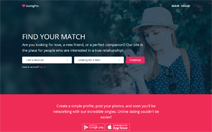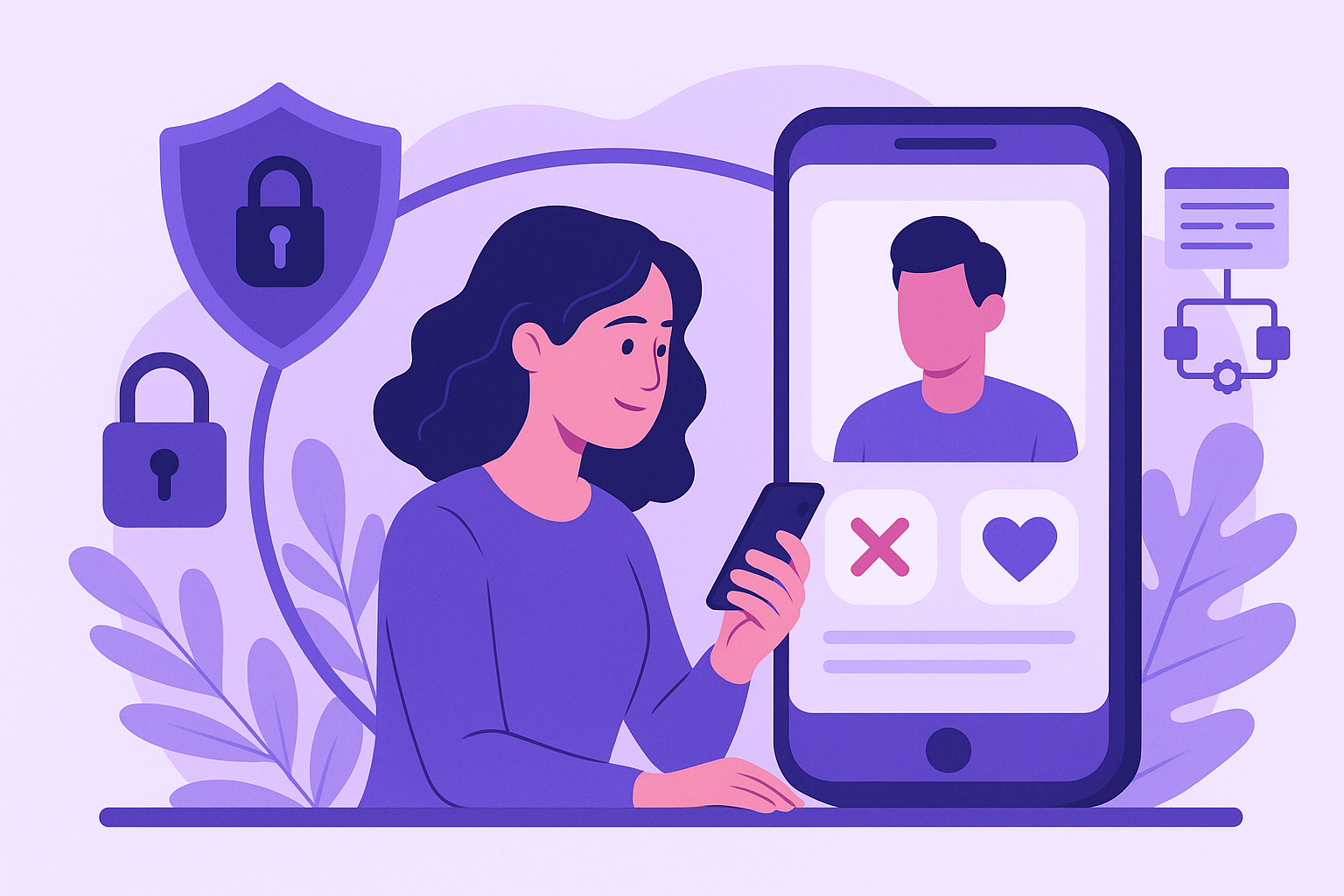Love Under Lock and Key: How Modern Dating Apps Protect User Privacy in 2025
“We met online” used to sound like the beginning of a love story.
Now it’s also the start of a data story.
Behind every swipe and flirtatious message lies a digital footprint — vast, intimate, and, in the wrong hands, deeply dangerous.
A Match Made in Data
Let’s not kid ourselves: dating apps are data goldmines. Every time a user signs up, they reveal not just who they are, but how they feel, where they are, who they want — and sometimes, what they fear.
We’re not just talking about names and profile pictures. Think geolocation, chat histories, intimate photos, sexual preferences, political leanings, even timestamps of every login and logout. For someone looking for love, it may feel harmless. For a bad actor, it’s jackpot-level access to a person’s private world.
And it’s not just hackers we’re protecting users from — it’s careless software, vague privacy policies, and platforms that haven’t caught up with the digital responsibilities of 2025.
Why Privacy in Dating Apps Matters More Than Ever
In a post-Cambridge Analytica, post-Bumble IPO world, trust has become one of the most valuable currencies online. Users are more informed, more skeptical, and quicker to abandon apps that feel shady.
A privacy breach in a dating app isn’t just about identity theft or spam — it’s about emotional safety. For many, these apps are places of vulnerability: closeted individuals, victims of abuse looking for new beginnings, people exploring identities they can’t share elsewhere.
So when privacy is compromised, it’s not just data that’s at risk — it’s dignity, safety, and the right to choose when and how to be seen.
The Two Watchdogs: GDPR and CCPA
To ensure apps play fair, two massive legal frameworks have emerged as the global standard: GDPR in Europe and CCPA in California. These laws weren’t built specifically for dating apps, but given the nature of the data involved, dating platforms are among those with the highest stakes in getting compliance right.
GDPR, for instance, demands that companies clearly explain what they collect, why they collect it, and how long they keep it. Users must have the right to delete everything — even their chat history and profile photos — with a single request. It’s about control, giving users ownership of their data in a world that often takes that for granted.
CCPA, on the other hand, is more focused on the right to know and the right to opt out. It allows users to see exactly what’s been stored about them, and to block companies from selling that information. And with California often setting the tone for U.S. regulation, CCPA is just the beginning of what’s quickly becoming a nationwide trend.
Together, these two regulations send a clear message: privacy isn’t optional — it’s expected.
The Reality Check: Most Apps Still Struggle
Many dating startups don’t mean to ignore data privacy — they’re just overwhelmed. The focus is often on user growth, UI, or monetization. Security and compliance become “nice-to-haves” instead of launch-day essentials.
Until something breaks.
Until a user’s photo leaks.
Until chats are accessed by mistake.
Until someone clicks “Report” and ends up exposing their entire message history to a moderator without consent.
Then the panic starts. But by then, it’s too late.
The Technical Side: What Safe Looks Like
A privacy policy on your website is a great start — but users need to feel safe while they use your app, not just when they read about it.
A secure dating app in 2025 takes privacy into its core architecture. Every login is encrypted. Every message is encoded from sender to recipient, meaning even the platform can’t peek inside. Photos aren’t just uploaded and left open — they’re stored on encrypted servers, often separated from the main database entirely.
Passwords? Not stored as-is. They’re salted, hashed (with algorithms like bcrypt), and unreadable even to your admin team.
And speaking of admins — proper role-based permissions mean your team sees only what they absolutely need to. Nothing more.
Modern platforms also monitor unusual behavior. If a user logs in from Berlin in the morning and from Rio two hours later, the system should pause and verify. If a moderator tries to bulk-download user profiles, a flag should go up. These systems aren’t just technical — they’re the new baseline for trust.
The Emotional Part: Communicating Privacy Clearly
Most users won’t read your privacy policy.
Even fewer will understand it.
But every user deserves to feel safe.
That’s why the tone and clarity of your privacy practices matter just as much as the code behind them. Avoid legalese. Avoid ambiguity. Instead of saying “We may share your data with partners,” say, “We don’t sell your personal information — ever.” That one sentence builds more trust than an entire 10-page policy.
Even better? Give users simple tools inside the app. Let them delete their account, export their data, or adjust privacy settings — without needing to email support or dig through FAQs.
Building Trust is a Daily Habit — Not a One-Time Update
User privacy isn’t a button you click once. It’s a culture.
That means ongoing internal audits. Updating security protocols regularly. Reviewing which third-party tools you use (because if your analytics plugin leaks data, it’s your name on the lawsuit).
It means asking questions like:
— Do we really need to store this data?
— Do we ever delete inactive accounts?
— If a journalist requested our security roadmap, would we be proud to share it?
It also means empowering your users. Let them ask questions, give feedback, even flag concerns — and take them seriously. Just like in relationships, communication builds trust.
What Dating Pro Is Doing About It
At Dating Pro, we believe love should feel safe — and so should the platform that enables it.
That’s why every project we launch includes:
• Built-in GDPR and CCPA compliance tools
• End-to-end encryption protocols by default
• Clear, editable privacy policies to match your audience
• Secure hosting and localized data storage options
• Custom features like user-controlled data deletion, consent prompts, and admin access logs
Whether you’re launching your first MVP or scaling to thousands of daily users, our team helps you stay not just compliant — but credible.
Because in the end, privacy isn’t about policy — it’s about respect.
Trust Is the New Swipe
Today’s users are savvier than ever. They’ll judge your app not just by the quality of matches or how sleek the UI is — but by how well it respects their dignity.
Dating is vulnerable. Building a connection takes courage. Your platform should never be the weak link in that process.
So ask yourself: if you were your own user, would you trust your app?
If the answer’s not a confident yes — it’s time to talk.
Dating Pro is here to help.
Let’s build love stories on a foundation of trust, transparency, and safety — one secure platform at a time.
Want help making your dating platform secure and compliant?
→ Contact Dating Pro for a free consultation.
Data Privacy & Security in Dating Apps
What personal data do dating apps collect from users?
Dating apps collect a wide range of personal data including name, age, gender, location, photos, chat history, device information, preferences, and even sensitive details like sexual orientation and health status (e.g., HIV status). Some also collect behavioral data, IP addresses, and payment history.
Are dating apps required to comply with GDPR?
Yes. If a dating app collects data from users in the European Union, it must comply with the General Data Protection Regulation (GDPR), regardless of where the company is based. GDPR requires clear consent, data minimization, and the right to delete or export personal data.
How does CCPA apply to dating platforms?
The California Consumer Privacy Act (CCPA) applies to dating platforms that serve users in California or meet certain thresholds (e.g., $25M+ in revenue or 50,000+ users). It gives users rights to access, delete, and stop the sale of their data.
What security measures should a safe dating app have?
A secure dating app should include end-to-end encryption, hashed passwords (e.g., using bcrypt), role-based access control, anomaly detection, and encrypted storage for user media. These measures protect user privacy and prevent unauthorized access.
What is data encryption in dating apps and why is it important?
Data encryption in dating apps ensures that sensitive user data — such as messages, photos, and login credentials — is protected during transmission (via TLS) and storage (via AES-256). It prevents data leaks and unauthorized access in case of breaches.
Do dating apps sell user data?
Some dating apps may sell or share user data with third-party advertisers or analytics providers. However, under laws like CCPA and GDPR, users have the right to opt out of such practices. Trusted platforms now often state explicitly that they do not sell personal data.
Can users delete their data from dating apps?
Yes. Under both GDPR and CCPA, users have the right to request deletion of their data — often called the “right to be forgotten.” Responsible dating platforms provide an in-app option to delete accounts and associated personal data.
What is “Privacy by Design” in dating app development?
Privacy by Design means that privacy and data protection are integrated into the core architecture of a dating app from day one — not added later as a patch. It includes minimizing data collection, limiting access, and making privacy settings user-friendly.
What should a good privacy policy for a dating app include?
A clear privacy policy should outline what data is collected, how it’s used, who has access to it, how long it’s stored, and how users can delete or export their information. It should be easy to read and available in multiple languages.
How does Dating Pro help dating app owners with data privacy?
Dating Pro provides built-in GDPR and CCPA compliance tools, including customizable privacy policies, encrypted data handling, secure hosting, and user control features like account deletion and consent management. The platform is designed with privacy and security as core principles.
Is compliance with GDPR and CCPA enough to guarantee user privacy?
No. Legal compliance is essential, but true user privacy also requires strong technical implementation, regular security audits, transparent communication, and a user-first approach. Compliance is the baseline — trust is built on ongoing responsibility.
Can users trust dating apps with their private messages and photos?
Only if the platform uses end-to-end encryption, secure storage, and limits internal access to private data. Users should review the app’s privacy policy and look for transparency about how data is handled.
Why is user privacy especially important in dating apps?
Because dating platforms handle highly personal and sensitive information. Breaches in this space can lead to emotional harm, reputational damage, and even real-world safety issues. Privacy is not just a technical issue — it’s a human one.
What is end-to-end encryption in dating chats?
End-to-end encryption means messages are encrypted on the sender’s device and decrypted only on the recipient’s device — even the platform itself can’t read them. This ensures total message privacy and protects against data interception.
How can I make sure my dating app is legally compliant?
To ensure compliance, implement clear privacy policies, user consent mechanisms, encrypted data processing, and user rights features (like data deletion and access requests). Work with legal experts or platforms like Dating Pro that offer built-in compliance support.




